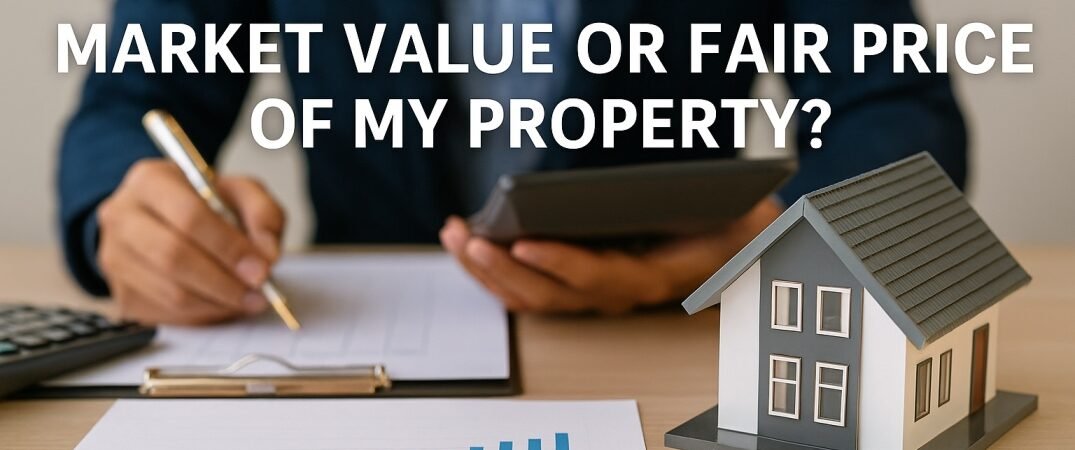Thinking of selling your property or just curious about its actual worth?
Whether you’re a first-time seller, an NRI, or an investor—knowing the true market value of your property is the first step to making an informed decision.
But here’s the truth:
📌 The price you feel your property deserves isn’t always what the market is willing to pay.
In India, market value and circle rate (government value) are two different concepts.
Let’s dive deep into how you can accurately determine the fair price of your property — legally, smartly, and confidently.
📌 What Is Market Value vs. Circle Rate?
Before we jump into methods, you must understand these two key terms:
✅ Market Value:
This is the price your property can fetch in the open market — what buyers are actually willing to pay. It fluctuates with demand, location, amenities, economic trends, and more.
✅ Circle Rate (Guideline Value / Ready Reckoner Rate):
This is the minimum government-assessed value used to calculate stamp duty and registration fees. It’s published by the State Registration Department and is usually lower than market value.
🔍 Your property’s final price must always be equal to or above the circle rate.
📊 Why Knowing Property Value Matters
- ✅ Sets a realistic selling price
- ✅ Avoids overpricing or underselling
- ✅ Helps in loan approval (banks assess property worth)
- ✅ Required for capital gains calculation
- ✅ Useful for gift or inheritance planning
🏠 Methods to Determine Market Value of a Property in India
Let’s break it down.
1. 📄 Check Circle Rate in Your Area (Govt Value)
Each state government publishes circle rates, which vary by:
- Locality/ward
- Type of property (residential, commercial, industrial)
- Built-up vs. plot
- Floor and road width
How to Check?
Go to your state’s registration department portal:
- Karnataka: https://kaverionline.karnataka.gov.in
- Maharashtra: https://igrmaharashtra.gov.in
- Delhi: https://revenue.delhi.gov.in
- Tamil Nadu: https://tnreginet.gov.in
📝 This gives you the minimum value, but actual market price may be 20–40% higher.
2. 🧾 Refer to Past Sale Deeds in Your Area
Visit the Sub-Registrar’s Office or the state’s IGR website to get:
- Past sale deeds of similar properties nearby
- Area-wise property registration data
- Sale price trends of last 1–3 years
This provides real-time data on what similar properties are actually selling for.
📌 Look for: same road, same size, same apartment or layout, same age.
3. 📲 Use Online Property Portals
Check popular real estate websites like:
- MagicBricks
- 99acres
- Housing.com
- NoBroker
Search for similar properties in:
- Your exact locality
- Same type (flat/plot/independent house)
- Similar area in sqft
- Similar age and amenities
💡 Note the listed price and also actual transaction price if available.
4. 🧠 Consult a Local Real Estate Expert
While you’re selling without a broker, you can still consult a real estate valuer or lawyer to help:
- Assess price based on comparable sales
- Evaluate land vs. construction value
- Calculate rental yield (if rented)
🎯 Get two or three independent valuations to cross-check.
5. 🏢 RERA-Registered Project Rates
If your property is in a building/apartment:
- Check current per-sq-ft rate of other RERA-registered projects nearby
- Visit https://maharera.mahaonline.gov.in or your state’s RERA portal
This gives a benchmark based on legal-compliant projects.
6. 📐 Use Government Approved Valuers (For Official Purposes)
If you’re:
- Selling to an NRI
- Declaring value for wealth tax / gift tax / court cases
- Seeking a bank loan or mortgage
👉 Then use a government-approved registered valuer to prepare a valuation report.
These are recognized by banks, courts, and income tax departments.
🧮 Example – How to Calculate Market Value
Let’s say you own a 1200 sq ft flat in Koramangala, Bangalore.
- Circle rate = ₹6,000/sqft = ₹72,00,000
- Market average from listings = ₹8,500/sqft = ₹1,02,00,000
- Recent sale deed of similar flat = ₹1 Cr
- Registered valuer report = ₹99–₹1.05 Cr
So, you can confidently quote a price of ₹98 lakh to ₹1.05 Cr depending on urgency and negotiation.
⚖️ Legal Precautions When Quoting Price
- Don’t undervalue below circle rate to save stamp duty — it’s illegal
- Mention sale price clearly in the sale agreement and deed
- If price is unusually low/high — IT scrutiny possible under Section 50C
🧾 Declare correct capital gains and TDS deductions while filing tax.
❌ Common Mistakes to Avoid
- Overpricing based on emotion
- Ignoring circle rate and legal benchmarks
- Relying only on what neighbors say
- Not updating yourself with latest registrations in your area
✅ Summary: 6 Ways to Find Your Property’s True Value
- Check official circle rate
- Refer to recent sale deeds in locality
- Compare listings on property portals
- Take help from a property lawyer or valuer
- Use RERA portal data for current benchmarks
- Hire a registered valuer for official valuation
📩 Call to Action
Still unsure about your property’s fair value?
At RJ Property Law, we help you:
- Legally verify and benchmark property value
- Connect with government-registered valuers
- Review sale deeds and circle rates
- Draft price clauses to avoid legal disputes
- Avoid under/over-valuation issues during registration or tax filing
📧 Email: ranjinijayaram@rjpropertylaw.com
📞 Phone: +91 80884 17193
🌐 Website: www.rjpropertylaw.com

